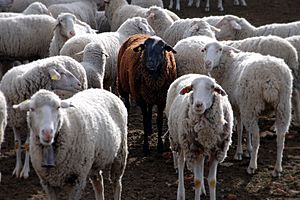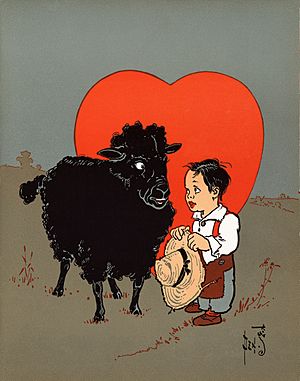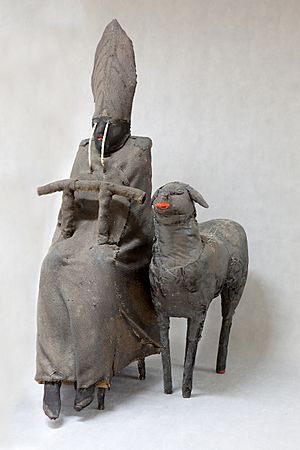Black sheep facts for kids
In the English language, the phrase black sheep is an idiom. It describes a person in a group who is different from the others. This is especially true for a family member who doesn't quite fit in. The saying comes from real sheep that have black wool instead of the usual white. These black sheep stand out in the flock. Also, their wool was worth less because it couldn't be dyed other colors.
The term often used to have a negative meaning. It suggested someone was disobedient or troublesome.
In psychology, there's something called the "black sheep effect." This means that people in a group tend to judge their own likeable members very positively. But they judge their own members who don't follow the rules more negatively. This happens more than when they judge people from outside their group.
Contents
Why We Say "Black Sheep"
Most sheep have white wool. This isn't because they are albino. It's because of a common dominant gene. This gene basically turns off color production. So, it hides any other colors that might be there.
Black wool, however, is caused by a recessive gene. This means that if a white ram (male sheep) and a white ewe (female sheep) both carry the hidden gene for black wool, about one out of four of their baby lambs could be born black. In most white sheep breeds, very few white sheep carry this hidden black gene. So, black lambs are usually much rarer than this.
How the Idiom Is Used
The saying "black sheep" started because black sheep were occasionally born into flocks of white sheep. Black wool wasn't good for business. This was because it couldn't be dyed different colors. In England during the 1700s and 1800s, people sometimes saw the black color of a sheep as a bad sign.
Today, the phrase isn't always so negative. But it's still used for someone in a group who has qualities that the group sees as unwanted. For example, the writer Jessica Mitford called herself "the red sheep of the family." She was a communist in a family of rich fascists. She meant she was very different from them.
The "black sheep" idiom is also used in many other languages. These include German, French, Italian, Spanish, and Polish. In some languages, like Russian and Persian, they use the phrase "white crow" to mean the same thing.
The "Black Sheep Effect" in Psychology
In 1988, some researchers named Marques, Yzerbyt, and Leyens did an experiment. They asked Belgian students to rate different groups of students. The groups included Belgian students they liked or disliked, and North African students they liked or disliked.
The results showed something interesting. The students rated their own group members whom they liked very highly. But they rated their own group members whom they disliked very low. The ratings for people from the other group (North African students) were somewhere in the middle. This idea of judging your own group members more extremely (either very good or very bad) than people from other groups is called the "black sheep effect." Scientists have seen this effect in many different group situations.
Why Does This Happen?
One main reason for the "black sheep effect" comes from how people see themselves as part of a group. People want their group to look good and special. So, group members tend to praise their likeable members even more. This makes their own group look better.
But what about group members who don't follow the rules or act in ways the group doesn't like? These "deviant" members can make the group look bad. To protect their group's good image, members might criticize these rule-breakers more harshly. They judge them more severely than they would if someone from another group did the same thing.
Things That Can Change the Effect
Even though the "black sheep effect" is often seen, sometimes the opposite happens. For example, in some studies, white participants judged Black people who were not qualified more negatively than white people who were also not qualified.
This shows that several things can influence the "black sheep effect." For instance, the stronger someone feels connected to their group, the more likely the "black sheep effect" will appear. Also, if a group feels very united, the effect might be stronger. Even the reasons why someone acts differently can change whether the "black sheep effect" happens.
See also
 In Spanish: Oveja negra para niños
In Spanish: Oveja negra para niños
- Black swan theory
- Dark horse
- Scapegoat
- Baa Baa Black Sheep
- The Ugly Duckling




